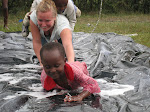 This past Saturday we held a Child Rights Seminar for women who work in our partner orphanages. We brought in Mr. Steven Ndosi, a facilitator at MS TCDC Center here in Tanzania. We covered a LOT in one day. Our goal was that those attending will leave with a deeper understanding of child rights and be able to apply those rights in practice when working with younger children.
This past Saturday we held a Child Rights Seminar for women who work in our partner orphanages. We brought in Mr. Steven Ndosi, a facilitator at MS TCDC Center here in Tanzania. We covered a LOT in one day. Our goal was that those attending will leave with a deeper understanding of child rights and be able to apply those rights in practice when working with younger children.
We looked at how childhood experience impacted youth as well as core assumptions with both rights and needs of children. We also reviewed Child Rights Implications for professionals and systems working with children and practices respecting and listening to the child.
It was also very important for us to do a brief overview of the general principles and implementation of UNCRC (United Nations Convention on the Rights of the Child) The UN Convention on the Rights of the Child is the most widely ratified international human rights instrument in history. It sets out minimum legal and ethical standards as well as aspirations for all state parties wit respect to the rights of children. In essence it is a vision with legal standards. This convention address social rights, economic rights, cultural rights, protective rights as well as civil and political rights.
Governments have the primary responsibility for ensuring that children’s rights are realized, they must create the legislative and policy environment to support and implement children’s rights. However, many other actors also have responsibilities. Parents or in the situation of most of our children, the matrons of the orphanages they are a have the primary day to day responsibilities for their own children. But communities, religious leaders, professionals, including health professionals, as well as civil society organizations at local, nation
al and international levels also have a part to play.
What happens if governments violate children’s rights?

Ratification of The Convention is no guarantee that governments will cease to violate, abuse or neglect children’s rights. In many countries that have ratified the CRC, children continue to be discriminated against, forced into armed conflict, sexually exploited, denied education, exposed to violence, denied access to health care, exposed to living and working conditions detrimental to their health and well-being, forced into bonded labor, die of preventable disease and are denied a voice in matters of concern to them.
The Convention on the Rights of the Children is often described as a “soft law”. No sanctions can be brought against a government that violates children’s rights. Constrictive dialogue with governments to press them to make changes is the only answer. Exposure, both internationally and nationally as well as a heightened awareness and understanding about the way in which these rights are being violates is a step in the right direction.
To see a complete listing of the rights in laymen’s terms check out http://www.unicef.org/rightsite/files/uncrcchilldfriendlylanguage.pdf
We then reviewed the ACRWL (African Charter on the Rights and Welfare of a Child). The main reason for having a separate ACR
WC was the feeling that Africa was under represented during the drafting process of the convention on the rights of the child. The UNCRC was perceived to negate the role of family in its treatment of the upbringing of the child and in matters of adoption and fostering. The African conception of the community’s responsibilities and duties and particularly the difficult socio-economic conditions of the continent made it necessary to have a separate document.
To read more about that please see http://www.africa-union.org/official_documents/Treaties_%20Conventions_%20Protocols/a.%20C.%20ON%20THE%20RIGHT%20AND%20WELF%20OF%20CHILD.pdf
Additionally in 2009 Tanzania passed The Tanzanian Child Act. This landmark legislation effectively domesticates the UN Convention of the Rights of the Child and provides the legal framework through which the rights of the country’s children can be protected and realized. To read more on that please see here.
We then spent some time discussing Advocacy for Child Rights. Adults in positions of professional responsibility have a duty to help educate others about Childs Rights and foster sustainable change for children. One key strategy for achieving such change is through advocacy. Advocacy comes in many types and forms, and can target all levels of the social ecology to effect change. Furthermore advocacy has no prescribed or clearly determined method, it can occur through a variety of mediums, e.g. radio, newspapers, magazines, discussions, and posters. Often children themselves are relatively powerless in advocating for the protection of their rights, as they lack access to the appropriate channels that influence public agendas and debates. That is why early childhood professionals can play an important advocacy role in partnership with children and on their behalf.

Moving forward we have asked those who participated in our seminar with Mr. Steven Ndosi share this information with the institutions they work with so that all of their staff can fully understand how to protect orphaned and vulnerable children throughout Tanzania.
I want to thank our Learning and Evaluation Director, Melissa Queyquep and our Scholarship Program Director, Josh Nassari for coordinating this seminar.






No comments:
Post a Comment